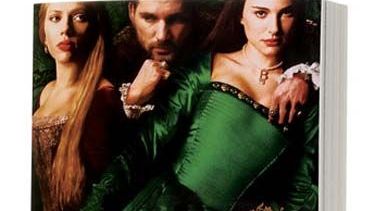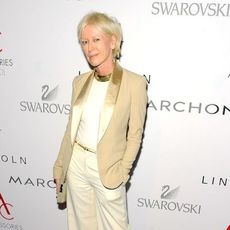
The Lowdown
It's history porn run amok in Philippa Gregory's lusty tale of Anne Boleyn's little sister Mary, who does hard time as the king's mistress before Anne takes over, becomes queen, then loses her head. Was the book club won over?
Will they hasten to the new movie version, opening February 29, starring Natalie Portman and Scarlett Johansson? Listen in . . .
YAEL (ASSOCIATE EDITOR): Even though it's not a book I would normally read, I actually kind of liked it, but in the same way I liked Melrose Place.
LAUREN (ARTICLES EDITOR): It was a trashy, bawdy soap opera—completely entertaining but so not literary.
EILEEN (EDITORIAL ASSISTANT): Gregory was always telling and never showing.
CLEO (STYLE DIRECTOR): God! She never went deeply into anything. You know how Edith Wharton can capture endless human complexity in a single moment? This was just pages and freakin' pages of blue gowns and green gowns and gabled hoods. It was like, When are we moving on from the hoods?
Stay In The Know
Marie Claire email subscribers get intel on fashion and beauty trends, hot-off-the-press celebrity news, and more. Sign up here.
LAUREN: But I have to admit I loved the sisters' ambivalent relationship. It was the one place where Gregory allowed her characters to be multidimensional.
CLEO: Like when Mary claims she never got anything from her affair with the king but love, and then Anne goes on to list everything that Mary ever got from him . . .
EILEEN: And when Anne tells Mary exactly how to seduce the king, then turns around and says, But I would never have done that . . .
LAUREN: And it's like, Oh, you bitch.
CLEO: But then there were parts where their loyalty to each other was moving. When Mary, who was wronged in so many ways, comes to help Anne as she starts to spiral downward.
LAUREN: Which is what you do! You can be horrible to your sister, but when she needs you, you're gonna totally be there.
YAEL: I don't know . . . at a certain point, even sisters can be beyond forgiveness. Like when Anne essentially takes Mary's son away from her, just in case she couldn't have her own. Not nice!
LAUREN: Let's talk about sex for a minute. I thought it was weird and inconsistent how lewd the story would turn in places—innocent and naive Mary is suddenly giving Anne blow-job advice?
EILEEN: Yeah! Mary is saying, Pull up your skirt and touch yourself. He loves that.
YAEL: I was trying to figure out how that worked with all the layers and the petticoats. Was her face completely covered?
LAUREN: And why was Anne depicted as such a shrew? Could a shrew really score the king of England?
YAEL: Ugh, I don't know. I felt bad for Anne. She was strong and ambitious, and if she had been alive today, she would have been a CEO. It was a takedown of the ambitious woman. Not to mention that Gregory pits the smart, frigid bitch against the warm, motherly idiot. I mean, let's talk about dating stereotypes.
CLEO: Also, I thought there was a parallel between the king's court and modern corporate culture. Henry reminded me of those big bosses who want all these bobblehead dolls around to make them feel good about their choices and decisions. And no one ever gets angry with Henry because they still need his favor. And I've seen people cluster around billionaires in the same way.
LAUREN: The other thing that was interesting— and this is probably also true in a modern corporate environment, too—is how everyone craves approval.
CLEO: Right. But it's not just about getting the king to like you. There is this very real distribution of favors.
LAUREN: Which is just so literal here. Like you're getting land or an earldom. And you don't have any HR departments with which to file grievances about it.
YAEL: But did you guys really believe that Mary actually loved the king? I kind of felt like she should've been onto his game.
CLEO: Actually, their relationship reminded me of Bill Clinton and Monica Lewinsky.
LAUREN: It always comes back to Bill Clinton.
CLEO: Well, just in the sense that there is this idea that women are dazzled by power and that we're hardwired to respond to the alpha male. So I don't think it's impossible that Mary would have been genuinely flattered and sexually excited that suddenly his laser beam was focused on her. Because he's really the center of everyone's universe, and now he wants her.
LAUREN: Right. He's the biggest prize man. Even when he gets the gout and the blisters, the women are still going after him because everyone wants a piece of what he can give them.
CLEO: It does make the courtiers look completely absurd and false and hideous.
EILEEN: I thought it was strange that after all the lies and deception that Mary had seen in the decade she'd been at court, that she's still expecting Henry to let Anne go at the end.
LAUREN: I took it as denial. The king promised to spare her—she was the queen, and he said was going to send her to a nunnery.
EILEEN: Could you imagine being sent to a nunnery?
LAUREN: I'm sure it was like the yoga retreat of their time.
CLEO: So was Anne a victim, or did she deserve her downfall?
YAEL: Both. The times weren't ready for her. What she needed was therapy.
LAUREN: And Prozac. Too bad it hadn't been invented yet.
NEXT MONTH: Let the Northern Lights Erase Your Name by Vendela Vida (Ecco/Harper Perennial).
-
 Olivia Rodrigo Is Bringing Visible Bra Straps Back
Olivia Rodrigo Is Bringing Visible Bra Straps BackThe pop-punk princess wore custom Victoria's Secret at Coachella.
By Julia Gray Published
-
 Meghan Markle’s New Netflix Cookery Show Begins Filming Today—But Not Where You’d Expect It to Be Shot
Meghan Markle’s New Netflix Cookery Show Begins Filming Today—But Not Where You’d Expect It to Be ShotThe Sussexes are having a busy week this week, shooting both of their his-and-her Netflix shows and rolling out the first product offering for Meghan’s new lifestyle brand American Riviera Orchard.
By Rachel Burchfield Published
-
 How I'm Redefining My Wellness Journey in 2024
How I'm Redefining My Wellness Journey in 2024Sponsor Content Created With The Honey Pot
By Aniyah Morinia Published
-
Blog Crush: The Bloggess
Jenny Lawson is hilarious, snarky, witty, totally inappropriate, and "Like Mother Teresa, Only Better"...and she's our Blog Crush of the Week, this week and every week. We first stumbled upon her on Twitter and plotted ways to make her our best fr...
By Diana Vilibert Published
-
Why Jyn Erso from 'Rogue One' Is the Feminist Hero We Need Right Now
Save us, Felicity Jones.
By Jen Ortiz Published
-
The Perfect Playlist for Your Next Road Trip
Shotgun riders, this one's for you.
By Lori Keong Published
-
 Johnny Depp and Kate Moss (Finally!) Reunite for Paul McCartney's 'Queenie Eye' (VIDEO)
Johnny Depp and Kate Moss (Finally!) Reunite for Paul McCartney's 'Queenie Eye' (VIDEO)Legendary exes Johnny Depp and Kate Moss reunite for Paul McCartney's 'Queen Eye' video. And you won't believe what they do...
By Sue Kang Published
-
 Supermom Smackdown
Supermom SmackdownA new book by American journalist Pamela Druckerman, Bringing Up Bébé, says that French mothers are superior to American mothers. Quelle horreur! Marie Claire gets le scoop
By Geraldine Sealey Published
-
 Your Guide to Miami's Art Basel
Your Guide to Miami's Art BaselYour guide to a fun-filled Art Basel weekend in Miami!
By Allison Ramirez Published
-
Women Working to End Hunger
Through seminars, photo exhibit, and advocacy work, Witnesses to Hunger is helping hungry and impoverished women and their children make their stories known!
By Allison Ramirez Published
-
 We're Winning! Marie Claire Racks Up the Awards
We're Winning! Marie Claire Racks Up the AwardsMarie Claire magazine and its amazing writers are being recognized for their journalistic excellence.
By Marie Claire Published